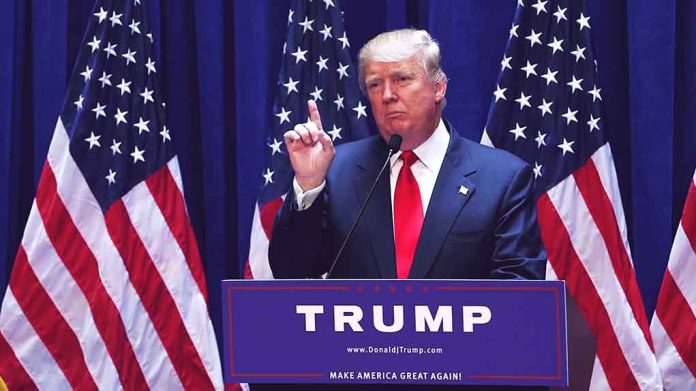
Republicans unveil a bold two-step plan to advance Trump’s agenda, focusing on border security and tax reform.
At a Glance
- GOP lawmakers propose a dual-phase reconciliation strategy to bypass Senate filibuster
- First phase prioritizes border security funding and immigration reform
- Second phase aims to extend Trump-era tax cuts and implement spending reforms
- Strategy faces challenges due to slim Republican majority and procedural hurdles
Republicans Unite Behind Two-Step Legislative Approach
In a strategic move to advance key elements of former President Donald Trump’s agenda, House and Senate Republicans are rallying behind a two-step legislative process. This approach leverages the reconciliation procedure, allowing bills to pass with a simple majority in the Senate, effectively sidestepping the filibuster. The plan, endorsed by the House Freedom Caucus and other conservative lawmakers, aims to address border security and tax reform sequentially.
The first phase of this strategy focuses on a “fully offset” and “focused” border reconciliation package. This initial bill would include funding for completing the border wall, expanding the number of border enforcement officers, and upgrading detention facilities. Additionally, it proposes measures to encourage self-deportation and restrict welfare benefits for non-citizens.
The tax-bill squeeze is on.
Republicans are trying to fit as many priorities as possible into one bill early next year, combining tax cuts, spending cuts, energy policy, border security and President-elect Donald Trump’s campaign promises.
Engineering the legislation that way…
— Tim Hanrahan (@TimJHanrahan) November 25, 2024
Prioritizing Border Security
The coalition of Republican lawmakers emphasizes the urgent need to address border security as a top priority. In a letter addressed to Senate Republican Leader John Thune and House Speaker Mike Johnson, they stated:
“It is our understanding that President Trump’s closest advisors and experts on the border believe they must have immediate resources to begin to undo the damage caused by the Biden Administration, secure the border, and start removals and repatriations on day one.” the influential caucus said.
This focus on border security aligns with Trump’s campaign promises and seeks to address what Republicans perceive as a crisis at the southern border. The proposed package aims to be fully offset by mandatory spending cuts and deficit reduction measures, demonstrating a commitment to fiscal responsibility.
Tax Reform and Economic Growth
The second phase of the Republican strategy targets tax reform and economic policies. This reconciliation bill would focus on extending the tax cuts implemented during the Trump administration while also introducing spending reforms aimed at fostering economic growth and fiscal discipline. The plan includes repealing green tax credits and identifying $2.5 trillion in necessary cuts.
“President Trump’s agenda will be enacted, and border security must move first – and then we should move forward to a second, larger reconciliation bill covering taxes, spending, energy, bureaucracy, and more. The House Republican Conference should ensure President Trump can deliver on this critical America First agenda priority as soon as he is sworn into office.” they said.
However, this ambitious two-step approach faces significant challenges. Rep. Jason Smith (R-Mo.), chairman of the House Ways and Means committee, expressed skepticism about the feasibility of passing two reconciliation packages in one year, citing historical precedent and the current narrow Republican majority in the House.
🚨🇺🇸 REPUBLICANS DIVIDED ON TRUMP’S 2025 AGENDA STRATEGY
Top Republicans are debating whether to bundle Trump's border, energy, and tax policies into one sweeping bill or split them into two smaller packages.
Ways and Means Chair Jason Smith is pushing for a single bill to… pic.twitter.com/atgn97YYqm
— Alex Kennedy (@therealmindman) December 11, 2024
Challenges and Opposition
The proposed strategy faces both procedural and political hurdles. The last time Congress enacted more than one reconciliation bill in a year was in 1997, highlighting the rarity of such an approach. Additionally, the slim Republican majority in both chambers of Congress presents a challenge in securing enough votes for these ambitious plans.
Democrats have already voiced their opposition to the Republican strategy. The Democratic National Committee criticized the GOP’s plans, emphasizing their commitment to lowering costs for Americans and opposing what they view as handouts to big corporations. As the political landscape continues to evolve, the success of this two-step legislative approach remains uncertain, with both parties gearing up for intense debates over the future direction of American policy.
Sources:
- Freedom Caucus backs two-track strategy to tackle Trump border and tax agenda
- House, Senate conservatives back 2-step process to enact Trump agenda
- House and Senate Republicans Rally Behind 2-Step Legislative Strategy to Deliver Trump’s Agenda














